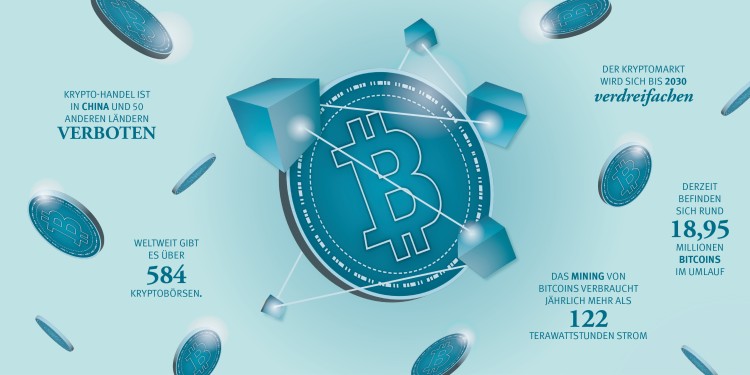
Cryptocurrencies: a rollercoaster ride
Cryptocurrencies: some people hype them, others disdain them – and most people have no idea what’s behind them. This digital currency is based on a complex, highly technological encryption process – the so-called blockchain. Hardly a day goes by without the daily press, specialist magazines or social media reporting on this decentralized system of payment – with the headlines presenting a controversial picture. These vary from “Member of ECB Board describes crypto-assets as a dangerous house of cards” to “New hard currency? Bitcoins are digital gold”.
The basic idea behind cryptocurrencies was, and still is, the development of a means of payment which evades monitoring and regulation on the part of banks and states, and which can be traded “covertly” (the name is derived from the Ancient Greek κρύπτο/krypto, meaning ‘hidden’ or ‘secret’). The origins of this development go back to the 1970s. Nowadays there are more than 10,000 cryptocurrencies, although only 100 of these achieve a daily turnover of more than 1,000 dollars. “Anyone looking for a secure way of investing their money should steer clear of today’s cryptocurrencies because developments in the crypto-market are extremely volatile and risky,” says financial expert Prof. Andreas Pfingsten from Münster University’s Finance Centre Münster.
One of the most well-known cryptocurrencies is Bitcoin (₿), which is limited to ₿21 million units worldwide. The reason for this is that the inventor of the Bitcoin, an unknown person or group using the pseudonym Satoshi Nakamoto, wanted to guarantee the stability of the currency’s value. However, at the beginning of the Corona crisis Bitcoin seemed unable to live up to its reputation as a safe currency in a crisis. There was a strong drop in demand and, as a result, its value collapsed and fell to a level below USD 5,000 per Bitcoin. But the currency recovered quickly and its value climbed steadily. Around half a year later the value stood at over USD 15,000, and in 2021 it reached its highest-ever level of USD 66,789 per Bitcoin. After months of hitting record after record, it is now dropping steeply again – not least because of the war in Ukraine. More than 300 billion dollars of investors’ money was wiped out in the crash, as the weekly newspaper “Die Zeit” reported in the summer.
It is pretty unlikely that normal people will be using Bitcoins in future to pay for their drinks or their ice-cream in a café, says Andreas Pfingsten. Nevertheless, a lot of traders are now accepting Bitcoins as a means of payment, e.g. Amazon, Edeka online or Kodak. In Japan, Bitcoins are already recognised as an official parallel currency, and in one of the cantons in Switzerland people can pay their taxes in Bitcoins. In El Salvador, Bitcoins are legal tender.
In the estimation of Prof. Bernhard Herz, an economist at the University of Bayreuth, cryptocurrencies are coming ever closer to the financial system and are gaining in importance. “The trust which people have in these decentralised digital currency systems plays a key role in deciding whether Bitcoins and the other cryptocurrencies are accepted by society,” he says. Gaining this trust is very difficult. In many cases, there is no reliable information available on the private companies which offer cryptocurrencies. And, in addition, this anonymous method of making transactions opens the door to illegal wheeling and dealing involving, for example, the financing of terrorism, money laundering and drug trafficking. And then there are the very strong price fluctuations,” says Herz.
Last year, for example, during criminal investigations in the drugs scene in Frankfurt, over 100 million euros in cryptocurrencies fell into the hands of the Public Prosecutor’s Office. According to the US company “Chainalysis”, which analyses blockchains, 2021 saw fraud involving the theft of 14 billion dollars in cryptocurrencies – a record amount – and in the same year there was a fourfold increase over 2020 in the volume of crypto-hacking. The German Association of Debt Counselling Services advises people, small investors, who got their fingers burned in the cryptocurrency market and have now initiated personal bankruptcy proceedings – and their number is on the increase.
In spite of all this, according to a recent survey carried out by the “Bitkom” Digital Association among more than 1,000 people in Germany, one-third of those questioned assume that cryptocurrencies are a good long-term investment, and one-fifth actually see them as a safe alternative to the established monetary system. The majority of those questioned – around two-thirds – have no faith in cryptocurrencies and consider them to be nothing but objects of speculation.
There are still many unanswered questions. Do cryptocurrencies help investors become rich quickly? Are they purely a lifestyle product? Do they make criminal activity easier? Or are they purely an ideology for all those people who place more trust in algorithms than in state-run banking institutions? The answers to these questions are likely to vary as strongly as the value of cryptocurrencies fluctuates – and also depending on who you ask. At any rate, currency expert Sören Hettler from the DZ Bank is certain that cryptocurrencies will not be disappearing anytime soon. “In spite of the global criticism of the speculative bubble often described,” he says, “the traditional financial markets sector, such as Central Banks, will have to react to cryptocurrencies and their development, in order to maintain or regain control over the financial system – but in particular in order to remain competitive.”
Author: Kathrin Kottke
This article was first published in the University newspaper “wissen|leben” No. 7, 16 November 2022
